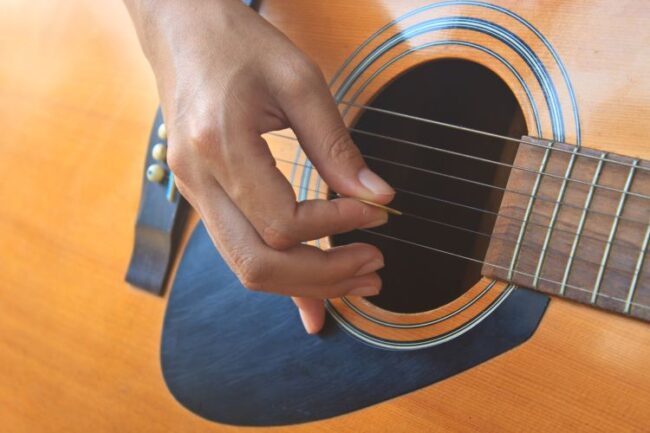From popular hard rock music to soft romantic songs, the guitar plays a significant role. Enthusiasts from all generations have once encountered the world of rhythms and used the guitar as an instrument to create something historical.
But as much as we like it, playing guitar is no joke. The mastery of any instrument requires years of practice and steady guidance.
People are always eager to buy a guitar, but with a lack of guidance, practice, and motivation ultimately lose the goal of winning mastery over guitar play. So here we’ll discuss the essential tips for beginners to help them play guitar to the heart’s content.
10 Tips for Beginner Guitarists to Master the Art of Playing Guitar

Playing guitar is more than moving strings; it’s an art and has specific terms and rules you must know. Here are the 10 most useful tips for guitar-learning beginners.
1. Learn About Your Instrument
The first day of learning guitar never starts with the guitar in hand. You must learn the basics first. Before using an instrument, it’s crucial to learn the full extent of its possibilities and limitations.
Thus it’s recommended to learn the names of chords, tuning pegs, and other parts of a guitar. You can enroll in guitar lessons in LA to learn more about the instrument and the usage of its different components.
2. Keep Your Guitar Out
Make it a habit to keep your guitar within reach. By having your instrument readily available, you’ll be more likely to pick it up and practice regularly. This constant exposure will motivate you to explore new techniques and spend more time honing your skills.
3. Learn the Holding Position and Guitar Pick

To play the guitar effectively, you need to learn the proper holding position. Hold the guitar against your body with your strumming hand resting on the soundhole or bridge.
Support the neck of the guitar with your fretting hand. Find a position that feels comfortable and allows you to reach all the strings easily. Experiment with different pick thicknesses to find one that suits your playing style.
4. Understanding the Importance of Strings
Strings are the heart and soul of any guitar, and understanding them is key to mastering your instrument. Just like choosing the right pick or adjusting your guitar settings, selecting the proper strings will significantly impact your playing style and sound. This is especially true for bass players, where bass guitar strings are important in shaping the deep, foundational rhythm that holds the music together. Bass guitar strings come in various gauges and materials, and experimenting with different types will help you discover the perfect fit for your tone and musical needs. Whether you’re playing a standard guitar or a bass, learning about strings is an essential part of becoming a well-rounded guitarist.
5. Play Less but Play Smooth
When starting, it’s common to be eager to play fast and complex solos. Start by practicing simple chord progressions and strumming patterns, gradually building up speed as you become more comfortable and proficient.
Every strike you make must need to be smooth rather than following the sound. Use a metronome or drum tracks to develop a sense of timing and play in rhythm. Pay attention to your hand movements and strive for fluidity in your playing.
Practice transitioning between chords smoothly and work on your finger dexterity through exercises and scales. By prioritizing smoothness and control, you’ll lay a solid foundation for more advanced techniques in the future.
6. Learn Complete Songs
Learning complete songs is a great way to improve your guitar skills. Instead of just practicing isolated techniques, learning songs allows you to apply those techniques in a musical context.
Start with simpler songs that align with your skill level and gradually progress to more complex ones as you gain confidence.
Focus on mastering the main chord progressions, melodies, and rhythms of the songs you choose. Break them down into smaller sections and practice them gradually.
As you become more proficient, challenge yourself by tackling songs that incorporate different playing styles and techniques. This approach will keep your learning engaging and enjoyable.
7. Practice in Dark

Practicing in the dark may sound unusual, but it can be a beneficial exercise. By playing without visual cues, you rely more on muscle memory and develop a stronger connection between your hands and the instrument.
This exercise helps improve your accuracy and overall playing ability. Playing in the dark also decreases your perfection anxiety as you can’t see your fingers play. Start by practicing familiar chord progressions or scales with your eyes closed.
This sensory awareness will enhance your muscle memory and train your fingers to find the right positions without relying solely on visual cues. Gradually increase the complexity of the exercises as you become more comfortable.
8. Adjust Guitar Settings
Take the time to understand and adjust the settings on your guitar. Explore the tone and volume knobs, pickup selector switches, and any other controls your guitar may have.
Sometimes guitar settings are doing more damage than good; thus, take advice from professionals to set your guitar.
Spend time exploring the various sound possibilities your guitar offers. Adjust the tone knobs to achieve a brighter or warmer sound, experiment with different pickup combinations, and try different effects if you have an electric guitar.
By understanding and utilizing your guitar’s settings, you can create a personalized sound that matches your musical style.
9. Never Hesitate to Ask
Reach out to experienced guitarists, take lessons from a qualified instructor, or participate in online guitar forums and communities.
Learning from others who have more experience can provide valuable insights and shortcuts to help you progress faster. Additionally, interacting with fellow guitarists can be a source of inspiration and motivation.
10. Learn to Play Along with Time

Developing a good sense of rhythm is essential for any guitarist. We tend to run faster than the tune often when we are beginners. Thus, practice playing along with a metronome or drum tracks to improve your timing and ensure you’re playing in sync with the beat.
Start by practicing simple strumming patterns or chord progressions with a metronome, gradually increasing the tempo as you become more comfortable.
This skill will greatly enhance your ability to play with other musicians in the future, as timing is crucial for maintaining a cohesive sound.
11. Practices Make Perfect
Needless to say, practice makes one perfect. So, once you start getting the hang of your guitar position, nodes, and strings, you can begin to prepare easy songs. Take a track and divide it into small parts to practice. With every passing day, you will hone your skills to perfection.
Conclusion

In short, beginner guitarists can embark on a fulfilling journey of mastering the instrument. So, embrace the process, practice diligently, and enjoy the rewarding experience of playing a guitar.
